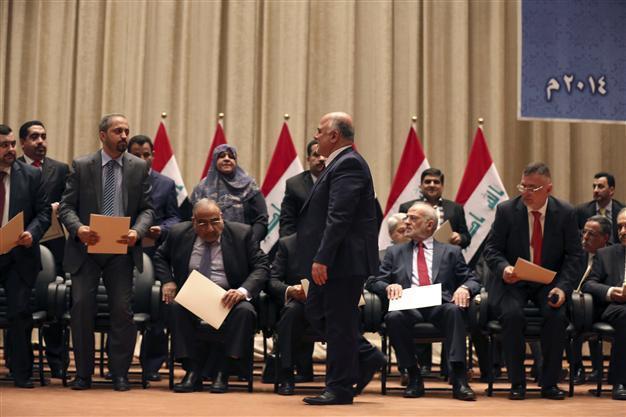Iraq MPs approve new government, Kerry to visit region
BAGHDAD - Agence France-Presse

Iraq's new Prime Minister Haider al-Abadi (C)attends the Parliament session to submit his government in Baghdad, Sept. 8. AP Photo
Iraqi MPs approved a new cabinet on Sept. 8 but key security posts remained unfilled, as America's top diplomat prepared to visit the region to build a coalition against jihadists.New premier Haidar al-Abadi had been under heavy international pressure to form an inclusive government that could present a united front against the militants, led by the Islamic State in Iraq and the Levant (ISIL) group, who have seized much of the country's Sunni heartland.
The outgoing government faced criticism that it alienated the Sunni Arab minority, revitalising militants within the community.
U.S. Secretary of State John Kerry, speaking a few hours before leaving on a mission to solidify the front against ISIL, praised the "new and inclusive" Iraqi cabinet as a "major milestone."
"Now is the time for Iraq's leaders to govern their nation with the same vision and sense of purpose that helped to bring this new government together," he said.
U.N. Secretary General Ban Ki-moon also welcomed the new government as a "positive step" but urged politicians to quickly choose new defence and interior ministers.
Meanwhile, the new U.N. human rights chief Prince Zeid Ra'ad Al Hussein said ISIL atrocities promised only a "house of blood" for those living under their rule, while the head of Egypt's prestigious Al-Azhar religious institution also condemned the group.
The crucial parliament session opened to chaotic scenes, with speaker Salim al-Juburi struggling to maintain order and many MPs absent.
Eventually, 289 out of 328 lawmakers showed up and helped approve three deputy prime ministers and 21 ministers, but key posts - including the interior and defence posts - remain unfilled.
Abadi has asked for a week to fill them, and will run the ministries in an acting capacity until then. The last government also started with key positions empty and acting ministers ended up filling them for four years. In a sign of the delicate balancing act required to paper over Iraq's deep sectarian and factional divides, three fierce rivals were also approved as the country's new vice presidents: former premiers Nuri al-Maliki and Iyad Allawi, and ex-parliament speaker Osama al-Nujaifi.
Kurds join in last minute
The cabinet is so far dominated by Shiite Arabs, who make up the majority of Iraq's population, and includes only one woman.
Iraq's Kurds - who control an autonomous region and are at odds with Baghdad over issues including territory and division of the country's vast natural resources - only took part at the last minute.
Their MPs were still waiting for word from their leaders in the northern city of Sulaimaniyah when parliament opened, and were waiting in the cafeteria.
They later arrived in the chamber, and Kurdish MP Ala Talabani announced during the session that the Kurds would participate in the government on a three-month trial period. They received two ministries and a deputy premiership.
Kerry was set to leave the United States on Sept. 9 on a trip to Jordan and Saudi Arabia as part of efforts to build an international coalition to counter the ISIL militants.
A State Department spokeswoman said more than 40 countries have already indicated a willingness to help in some way against the jihadists.
President Barack Obama, who made his political career opposing the war in Iraq and pulled out American troops in 2011, has promised to unveil a long-awaited strategy on Wednesday to tackle IS in both Iraq and neighbouring Syria.
"We are going to systematically degrade their capabilities. We're going to shrink the territory that they control. And ultimately we're going to defeat them," he told NBC's "Meet the Press" on Sept. 7, adding that the strategy would not involve U.S. ground troops in Iraq.
Prince Zeid, the first Muslim and Arab to serve as U.N. High Commissioner for Human Rights, said ISIL had already shown the world what its rule would be like if left unchecked.
"It would be a harsh, mean-spirited house of blood," he said in his maiden speech to the U.N. Human Rights Council. ISIL "has demonstrated absolute and deliberate disregard for human rights."
Washington expanded its air strikes to the Sunni Arab heartland over the weekend, hitting ISIL targets around a key dam on the Euphrates that troops have been battling to defend with the support of allied tribes.
Other key appointments to the new Iraqi government on Monday including former vice president Adel Abdel Mahdi as the new oil minister, former prime minister Ibrahim al-Jaafari to the foreign ministry, and former deputy premier Roz Nuri Shaways as minister of finance.
Saleh al-Mutlak will continue as deputy prime minister, while the other two deputy premier posts went to ex-foreign minister Hoshyar Zebari and MP Baha al-Araji.
















